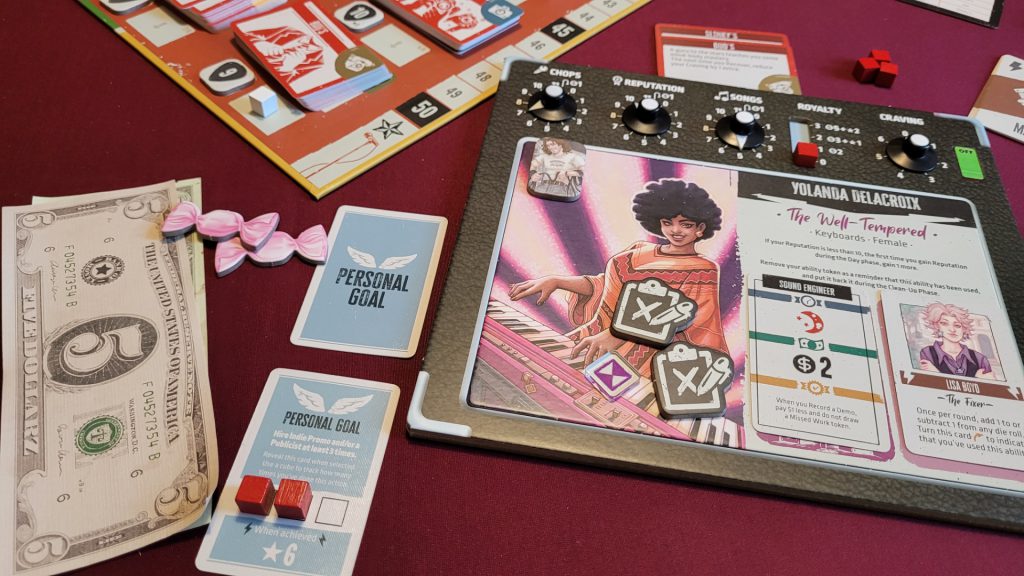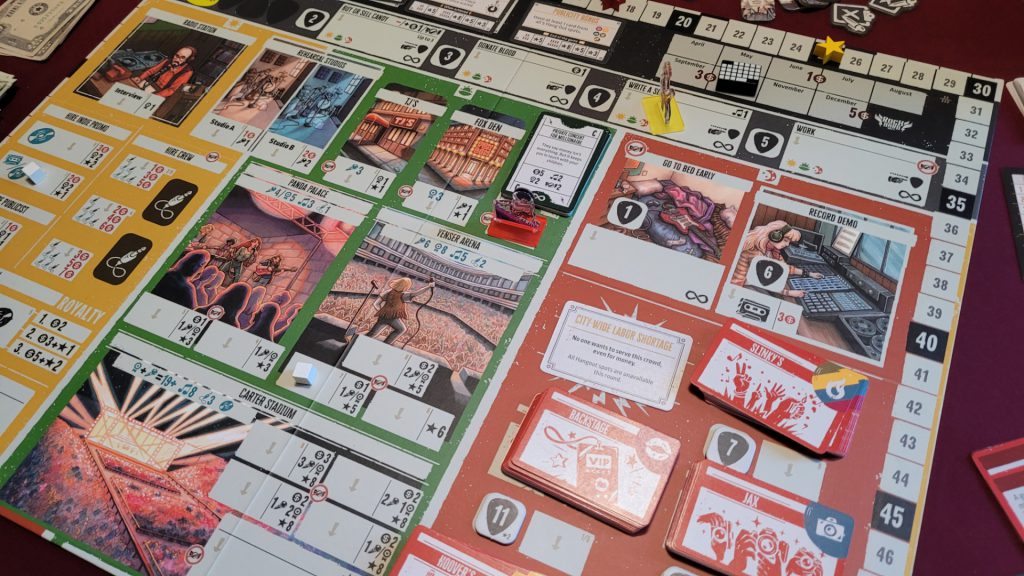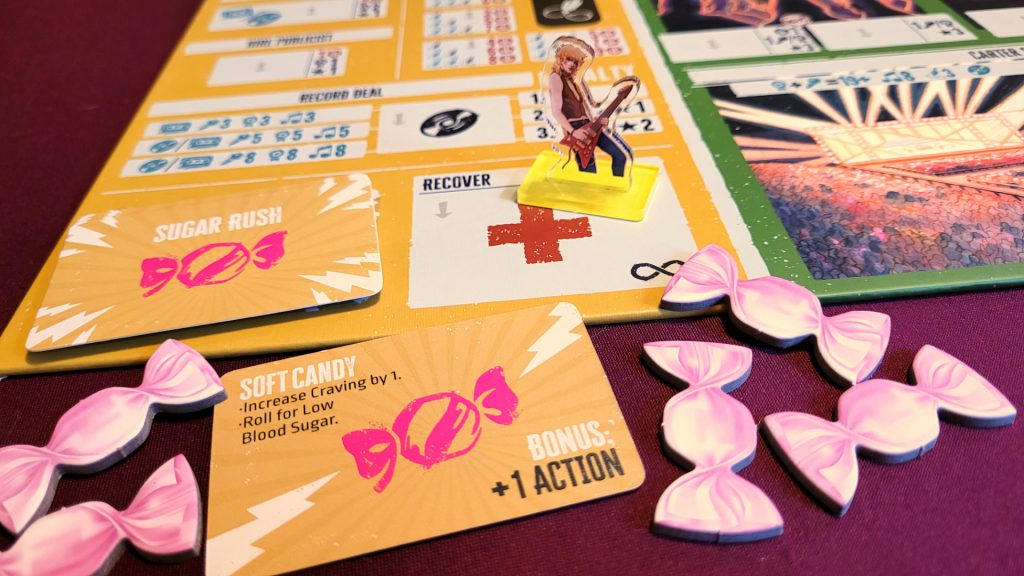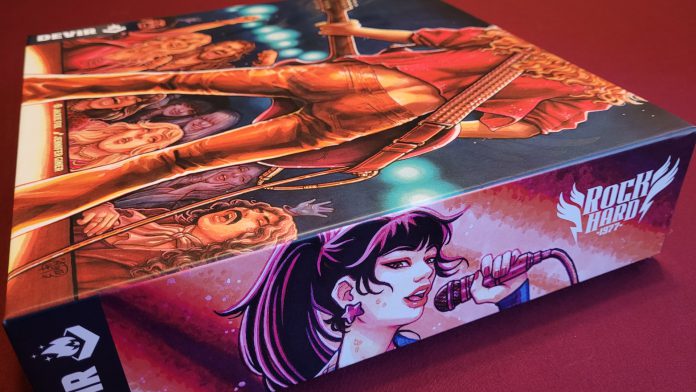For the longest time, it seemed like Cthulhu or farming were the only options for the discerning board gamer.
This is an exaggeration of course, but one of the many great things about the board gaming explosion of the past 10 years has been seeing the audience grow beyond wargamers and fantasy roleplayers, and watching the industry spread its wings accordingly. Where hobby board gaming used to be primarily limited to traditional genres like horror and science fiction, we now have games covering every conceivable topic, from fashion design to strolling through a national park. And now there’s a board game about making it big in the 1970s music scene.
Jackie Fox, the designer of Rock Hard: 1977, is uniquely suited to the task of creating a game about the music business. Not only is she an avid board gamer, she’s a multiple Jeopardy! winner, an entertainment industry lawyer, and perhaps most importantly, the original bass player for the Runaways, the band that introduced the world to the likes of Joan Jett and Lita Ford. Presumably the game draws heavily from her personal experience as a struggling musician in the 1970s – the tone is fairly light, but the game has an air of authenticity that stops it from seeming like a parody. It’s a game that takes its subject seriously, but not too seriously.

That’s Rock’n’Roll
Players take on the roles of up-and-coming musicians. The characters are entirely fictional and (as near as I can tell) based on archetypes rather than specific people. Players are able to choose from a selection of lead singers, guitarists, bass players, keyboardists, and drummers, each with a unique ability to help them navigate the game’s labyrinth of radio interviews, arena shows, and after-hours clubs. Each player gets an additional unique in-game ability in the form of a manager, but watch out, there will be dire consequences if your manager isn’t paid regularly…
The core mechanic of the game is worker placement, with each round split into day, night, and after hours phases. In each phase, players choose actions that will gain them one or more of the game’s three base statistics: chops (musical ability), reputation, and songs. The higher these stats go, the more high profile gigs you can play, which earns you more money and increases your base stats further. The player boards that track these stats are designed to look like amplifiers, with turning plastic knobs – and yes, they go to 11.
Just like in real life, money is an ongoing concern. You need it to hire roadies so you can play larger venues, and also to record the demo tape that you need to get a record deal, which in turn gets you a regular income. Each character starts out with a randomly determined “day job” that provides quick cash when you need it, but you will quickly come to resent the amount of time it takes up (much like real musicians do). If you skip work too many times you’ll lose your day job, but that’s almost a reward for when you get to the point where you’re making enough money with the game’s other actions that you don’t need it any more. It’s an amusing (and possibly symbolic) design touch that your job card covers up a space on your player board that proudly declares you a “professional musician,” making discarding it all the more triumphant.

Night Moves
The way the worker placement spaces shake out, you handle business during the day and play gigs at night, so what do you do after hours? One of the options is to go to bed early, which is tragically uncool but does let you go first in all the phases of the following turn. The more exciting option is to hang out in bars and nightclubs.
This section of the board offers five spaces, each with its own deck of cards to draw from. Some of the cards feature little incidents that can give you extra cash or increase your base stats, and all of them have one of four different icons that provide a set collection element to the game. As soon as you have a set of four cards with icons that are either all the same or all different, you exchange them for 5 fame points. It represents an element of the music business that I expect is all too real – it’s just as much about being seen in the right places by the right people as it is about musical talent.
Go Your Own Way
The game’s basic trajectory from part-time bartender to full-time rock star seems fairly obvious, but there’s more than one way to gain fame points and win. At the start of the game, each player is given two personal goal cards, which are kept secret from the other players and offer various tasks that can be performed to get extra points. Additionally, Each game starts with three randomly chosen bonus cards that are played on the table and offer points to the first player to accomplish certain goals such as landing the first record deal or maxing a base stat out to 11.
They may seem like afterthoughts, but these bonus point providers shouldn’t be taken lightly, and it’s important to keep an eye on what your opponents are doing. My group played a game recently where the eventual winner didn’t play a single gig or even get a record deal, he just spent the whole game hanging out in nightclubs and nailing down most of the “be the first to…” bonuses. It was kind of annoying, but at the same time it created a fun narrative about the difference between being a musician and being a rock star – it was easy to imagine him being a talentless hack who got by on charm and influence alone.

Fly Like an Eagle
The game ends after 9 rounds, each representing a month in the life of the aspiring rock stars. With each round divided into three phases and only one action each phase, it doesn’t seem like there are enough turns to get anything done, especially with your pesky day job getting in the way. That’s where candy comes in.
The game’s rule book describes candy as “…too much coffee, adoration from an ever-greater number of fans, or anything else that gets your heart pumping. ‘Candy’ is just the boost your character might need…” I think we all know what they’re talking about, but this description humorously allows the game to feature a potentially troubling element of the entertainment business without getting too heavy with it or glorifying something that they shouldn’t.
In-game, candy is a currency that is often gained as a reward for playing random gigs or as a result of an event or hang out card (there is also an action space where it can be bought or sold). At the start of a turn, a player can exchange one piece of candy for a randomly drawn “sugar rush” card that will provide anywhere from zero to two extra actions, allowing the player to take advantage of multiple action spaces on the same turn and get more done.
However, there is a down side (as well there should be). Each time you use candy, your craving level goes up, and you have to roll a die. If the roll is less than your current craving level, you go into “sugar shock” and have to spend the day phase of your next turn in recovery, rather than performing actions. Essentially, using candy is getting an extra turn now at the risk of losing a turn later, and it introduces an interesting push-your-luck element to the game.
We Are the Champions
The game ends when one player gets to 50 fame points, or at the end of nine rounds. There are several end-of-game bonuses, so it can be anyone’s game right up until the end.
Rock Hard: 1977 is one of those rare games where the theme is intrinsically tied up with the game mechanics, to the point that you will probably have a hard time enjoying the game if you can’t get into the theme. However, in this case, the story of the aspiring musician employing a combination of hard work and dumb luck to finally make it big is such a universal story that just about anyone should be able to relate to it, at least long enough to have a rockin’ good time with the game.
Have any questions or feedback? Drop us a note in the comments below or email us at contact@goonhammer.com. Want articles like this linked in your inbox every Monday morning? Sign up for our newsletter. And don’t forget that you can support us on Patreon for backer rewards like early video content, Administratum access, an ad-free experience on our website and more.


